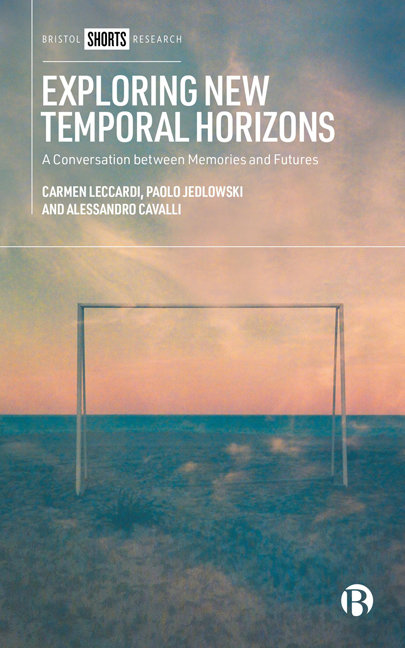Two - Futurity: Changing Futures in a Changing World
Published online by Cambridge University Press: 28 March 2024
Summary
Between past and future
Hannah Arendt, the scholar who made public action the heart of her reflection, directly references temporality to denounce the crisis wrought by mass society on the construction of being-with-others within the public space and, therefore, of political action in general. More specifically, Arendt evidenced the unbridgeable discontinuity between past and future produced by the demise of tradition – which is understood as a tradition of ‘opening up to the world along with others’.
Published in the US at the beginning of the 1960s, Between Past and Future: Six Exercises in Political Thought (Arendt, 1961) collects reflections elaborated between the mid-1950s and the early 1960s. The book openly expresses Arendt’s acute discomfort regarding her present, marred by the loss of the collective memory of the struggle for liberation from Nazism. With the fracture in memory, not only does the past fade into uncertainty but the present also ends up lost in the crisis. Lacking resonance, past and future drag the new generations towards a meaningless horizon.
Chapter One ended, significantly, with a reference to the legacies – good or bad – left by each generation to the next. These legacies are shaped by memory and can be infused with energy and transformation potential by expectations of the future. Chapter Three will focus on generations as a critical junction of the materialization of time, sitting at the centre of the transition between past and future.
This transition is at the heart of Arendt’s book. In fact, the preface to the book is titled ‘The Gap between Past and Future’ and opens with a metaphor quoted from French poet René Char, who was part of the French Resistance movement. Proposed by Char in the last year of the Resistance, between 1943 and 1944, the quote reads: ‘Notre héritage n’est précedé d’aucun testament’ (‘Our inheritance was left to us by no testament’) (Arendt, 1961: 4). According to Arendt, this metaphor is meant to convey the difficult relationship between past and future when the inheritance received is not legitimized by any tradition (the testament). A testament, as we know, connects the past and future together through an act of will, thus granting the continuity between what was and what will be for what concerns the use of certain assets.
- Type
- Chapter
- Information
- Exploring New Temporal HorizonsA Conversation between Memories and Futures, pp. 45 - 79Publisher: Bristol University PressPrint publication year: 2023



